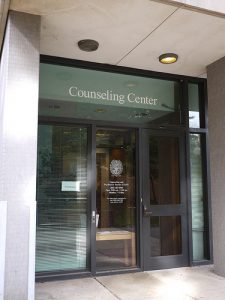The Georgetown Scholars Program (GSP) is finally returning to a renovated, permanent space in Healy Hall next year, according to a recent university announcement. The flagship program for first-generation and low-income (FGLI) students was moved out of its long-time space in Healy Hall last January and has resided in a temporary Leavey Center office since November 2021.
A more detailed plan from Aug. 26 revealed that construction for the new GSP space will begin on the ground floor of Healy Hall this spring, and will conclude by Fall 2023. In addition to housing the GSP office, the renovated Healy space will include a new Catholic Student Life Center, a Catholic ministry community space, an office for health and wellness programming, and an all-access student lounge.
While Healy would be the first home for most of these new planned ground-floor offices, GSP had operated out of Healy for over a decade before its relocation in 2021. The proposed return to Healy, therefore, is a homecoming.
“The GSP office’s location in Healy not only serves as a central, easily accessible space for support and community to some of the most disadvantaged students on campus, but allowing this space to be located in the heart of campus also signifies that the university recognizes and supports us,” Otice Carder (COL ’23), a GSP scholar, wrote to the Voice.
That recognition and support have not always manifested in an adequate physical space—the current temporary office is separated into three different rooms. The new floor plan will triple the office’s original size, and will house workstations, a lounge, and a meeting area for GSP scholars, providing valuable opportunity for community building. In addition, it will provide phone booths, a kitchen, storage space, a bathroom, and private offices for GSP staff—basic amenities the program has long advocated for.
“I have heard from alums and current seniors about how the GSP lounge used to always be filled with movement from both staff and students who would stop by to say hi, grab something to eat, study or just hang out in community—quite the contrast from our current lounge situation that can’t fit much more than 6 people,” Sabrina Perez (COL ’24), marketing coordinator of the GSP Student Board, wrote to the Voice.
GSP started as a university scholarship that supported around 50 students in 2004 and became a full-fledged program in 2009 following advocacy by Amy Hang (COL ’09), who believed that FGLI college students required more than mere financial resources to navigate Georgetown. This transformation made it clear to students and administrators that GSP needed a physical space to adequately support its students.
Throughout the years, GSP stayed persistent in its core mission of building a more equitable Georgetown experience for FGLI students. The program currently serves over 650 students by providing advising and mentorship opportunities, allocating necessity funding, hosting event bondings, and organizing advocacy—resources their more privileged peers often enter Georgetown already having. These resources can be life-changing: The graduation rate of GSP scholars is 94 percent, compared to a 26 percent national average for first-generation students.
“I love being a part of the GSP community because it is a supportive group of people that I am able to relate to,” Munasip Ertakus (NHS ’25) said. “It really is an instant connection when you meet another GSPer because there are not many of us and we can understand one another. It definitely makes me feel safe and appreciated having GSP as a program on our little campus.”
In January 2021, the university announced a proposal to move GSP out of Healy, planning to co-locate GSP with the Women’s Center, LGBTQ+ Resource Center, and Center for Multicultural Equity and Access in the basement of New South, a freshman dorm on the edge of campus. The university had attempted a similar consolidation and relocation in 2014, but stopped after receiving significant student pushback.
In contrast to the 2014 procedure that solicited student feedback, the university did not preemptively announce the 2021 GSP relocation plans to most scholars. The pandemic further inhibited a collective in-person response; by the time most students returned to campus in Fall 2021, the former Healy office was empty.
Nevertheless, when students found out about this change, they organized in opposition. Nearly 400 students and 40 student organizations signed a GUSA petition advocating for preserving the GSP office in Healy. “Healy is a Georgetown landmark, and therefore a symbol that FGLI students not only belong at Georgetown but that they are central to the university’s mission,” the petition read.
Alumni also rallied resistance to the relocation. Emily Kaye (COL ’18), a former president of the GSP Student Board, helped garner more than 1,200 signatures for a change.org petition opposing the relocation.
In response, the administration amended its plan, and announced last fall that GSP would return to Healy—instead of moving to New South—once renovations are complete. Between January and November of 2021, however, GSP was officeless. In November 2021, GSP began operating out of its current transitional space in Leavey 433.
“Staff members and student workers alike have tried to make the best out of the change, making the current lounge as cozy as possible with couches, snacks, tea and coffee, but the inaccessible, hard-to find location and the small size of the space does not have the same capacity as our old space,” Perez wrote.
“I’ve seen GSP come to life in various university spaces over the years,” Missy Foy, the executive director of GSP, wrote. “There is no substitute for the opportunity that students are given when they are able to congregate physically together. I think that’s what our office space does best: create casual opportunities for first gen students to meet other students and navigate college together.”
“Our new large space in the center of campus will represent how we deserve to be heard and take up space in a traditional academic setting that has oftentimes forgotten to include us,” Perez added.






